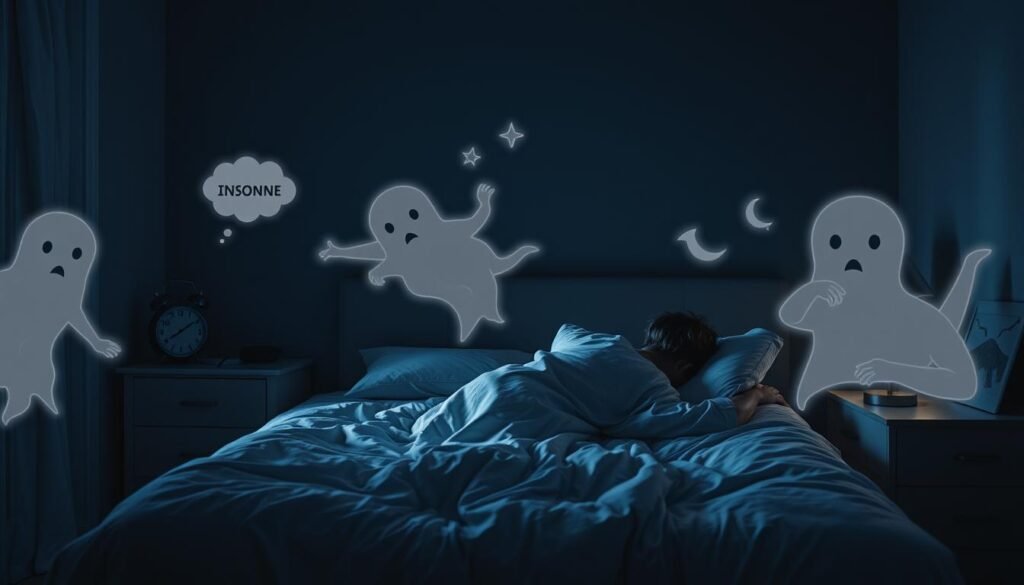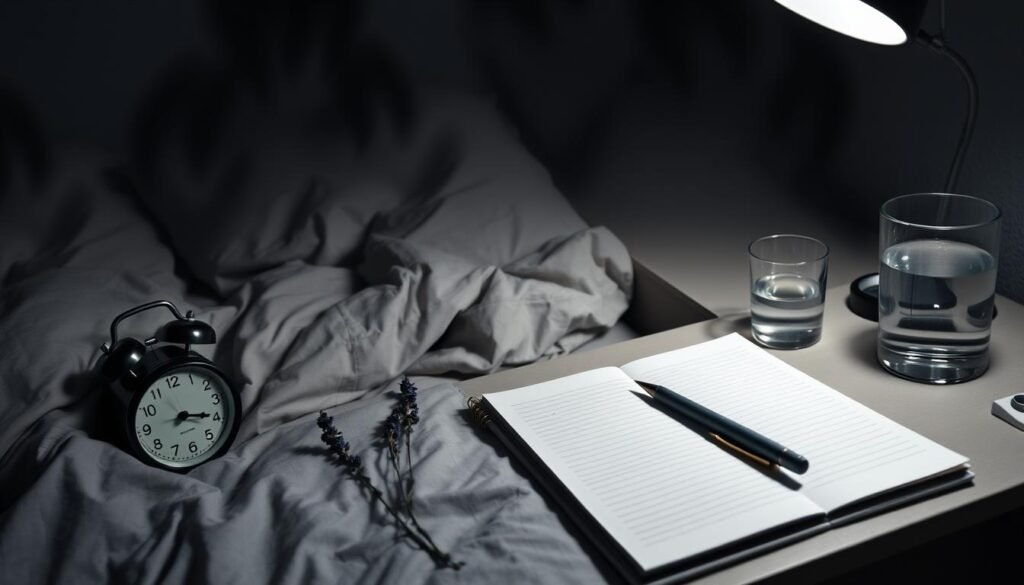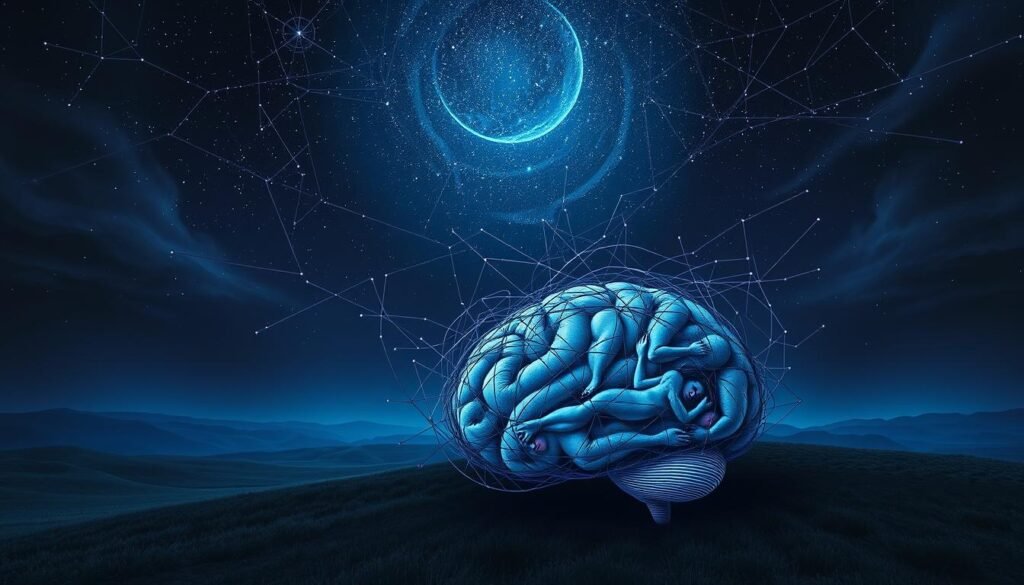Did you know that insomnia affects up to 35% of adults in the United States? Many don’t realize how much poor sleep impacts their well-being. It’s key to know if you’re dealing with a sleep disorder. Our test helps you understand your sleep by looking at problems like trouble falling asleep, waking up often, and feeling tired during the day. This fast test sheds light on insomnia and urges people to get help if they need it. This way, they can work towards better sleep and improve their mental health.
Key Takeaways
- Insomnia affects approximately 35% of adults in the U.S., highlighting its widespread impact.
- Women, older adults, and those experiencing stress are more susceptible to insomnia.
- The Insomnia Severity Index is a trusted tool for assessing the severity of insomnia symptoms.
- Sleep quality significantly influences both mental and physical health.
- Understanding one’s insomnia symptoms is a critical step toward healthier sleep habits.
- Seeking professional help can lead to effective treatment options, including cognitive-behavioral therapy.
Understanding Insomnia and Its Impact on Daily Life
Insomnia is more than just trouble sleeping. It deeply affects everyday life. Many people find it’s linked to depression or anxiety. About one-third of adults suffer from mild insomnia, showing it’s quite common.
Effects of poor sleep can vary a lot. They include emotional problems and thinking issues. It disturbs personal life, family, work, and overall happiness. Insomnia gets serious if it happens for three months, three nights a week. Not sleeping enough can make health issues like obesity and high blood pressure worse.
Older adults and women are more likely to have insomnia. Over half of older folks say it hurts their health and happiness. Many things can keep insomnia going. This includes health problems, certain drugs, and changing work hours. It’s crucial to manage and treat insomnia well because of these issues.
To really understand insomnia means knowing its big role in health talks. Admitting to these sleep problems is the first step to better sleep. This begins the journey towards feeling better overall.
Common Symptoms of Insomnia
Insomnia comes with symptoms that greatly affect daily life. Many people report not getting enough sleep and facing several difficulties. These challenges signal a problem with sleep health. Knowing these symptoms helps in deciding when to seek expert advice.
Difficulty Falling Asleep
Falling asleep can be hard for those with insomnia. They often lay in bed awake, feeling upset and anxious. Many spend the night looking at the ceiling, unable to calm their thoughts.
Frequent Nighttime Awakenings
Waking up often during the night is another issue. People may wake up several times and find it hard to fall back asleep. This interrupts the sleep pattern, leading to tiredness the next day.
Daytime Fatigue and Mood Changes
Insomnia often leads to feeling very sleepy in the daytime. This makes doing everyday tasks hard. Mood swings also happen, with quickness to irritability and grumpiness. Feeling stressed and not sleeping well can worsen insomnia symptoms, creating a tough cycle.

| Insomnia Symptoms | Effects |
|---|---|
| Difficulty Falling Asleep | Frustration and Anxiety |
| Frequent Nighttime Awakenings | Disrupted Sleep Cycle |
| Daytime Fatigue | Lack of Focus, Mood Swings |
| Irritability | Interferes with Daily Activities |
Key Factors Contributing to Insomnia
There are many elements that cause insomnia. They help us find how to treat it effectively. Things like stress and mental health issues can make sleeping hard. Also, certain health problems can worsen sleep issues. It’s key to look at how overall health affects sleep.
Psychological Factors
Psychological issues often lead to trouble sleeping. High stress or mental health problems are common causes. Big emotional upsets or life changes can also disrupt sleep. Cognitive behavioral therapy for insomnia (CBT-I) is a top recommended method to tackle these issues.
Medical Conditions
Health issues can mess with sleeping well. Things like chronic pain, diabetes, and breathing problems are big factors. This creates a cycle where bad sleep makes these conditions worse, impacting overall health.
Work and Lifestyle Influences
Your lifestyle and work can affect your sleep. Odd work hours, like night shifts, can throw off your sleep patterns. Too much caffeine, screen time before bed, and a bad sleep environment can be bad for sleep. Paying attention to these after being diagnosed with insomnia is vital for better sleep hygiene. Making a regular bedtime routine and handling light exposure helps improve sleep.
To learn more about treating insomnia, including meds and lifestyle tweaks, check out ways to better sleep.
Insomnia Symptoms Test: A Self-Assessment Tool
The insomnia symptoms test is key for checking your sleep health. It uses the Insomnia Severity Index to measure how bad your insomnia is. This index helps you see your sleep problems clearly.
Understanding the Insomnia Severity Index
The Insomnia Severity Index has ten questions. These questions cover your sleep habits, quality, and how tired you feel during the day. By taking this test, you’ll learn more about your sleep and how to improve it. Scores range from 0 to 60 points:
| Score Range | Interpretation |
|---|---|
| 0-15 Points | Minimal to no concerns regarding insomnia |
| 16-25 Points | Potential for mild insomnia symptoms |
| 26-35 Points | Moderate concerns regarding insomnia |
| 36-60 Points | Significant insomnia symptoms; may need intensive therapy |
Taking the Test: What to Expect
When you take the insomnia symptoms test, you’ll answer questions about your sleep and lifestyle. This test will tell you if you have issues like daytime tiredness or trouble focusing. Knowing your score on the Insomnia Severity Index is the first step to get better sleep.

The Connection Between Sleep Disorders and Mental Health
The link between sleep disorders and mental health is complex but very important. Research shows that those with mental health issues like anxiety or depression often have insomnia too. This link can lead to a cycle that worsens both sleep and mental health problems. Knowing about this link is key to managing and treating both.
The Cycle of Insomnia and Depression
Insomnia can increase the risk of depression. Studies point out that those with insomnia might be twice as likely to feel depressed. Lack of sleep can mess up our emotions and make us more prone to mood disorders. In fact, about 75% of people with depression struggle with sleep. This means poor sleep can make mental health issues worse, which can make sleeping even harder.
Anxiety and Sleep Difficulties
Sleep disorders are also common in those with anxiety. Many people with anxiety find it hard to sleep or stay asleep through the night. This is especially true for those with social and performance anxieties. Insomnia can make anxiety symptoms worse. But, cognitive behavioral therapy for insomnia (CBTI) has been shown to help with sleep issues and ease anxiety symptoms.

Understanding the connection between insomnia and mental health is key to getting better. Treating both insomnia and mental health problems together can improve well-being. Looking into options like exercise, behavioral therapies, and light therapy can help. For more tips on managing insomnia, check out this resource.
Importance of Sleep Quality Assessment
It’s essential to deeply understand the need for good sleep quality assessment. This is key in finding out if someone has insomnia. About 10% of people have insomnia at any given time. Knowing how sleep problems affect a person lets doctors create better treatment plans.
Many people find it hard to sleep, with 57% struggling to fall asleep. Another 53% can’t stay asleep. These numbers show why we need good ways to measure sleep. By checking sleep quality, doctors can diagnose insomnia. They can also come up with ways to help.
Patients can use different ways to check their sleep, including:
- Sleep diaries help spot patterns and behaviors that affect sleep.
- Talking with doctors gives insight into how a person’s history may affect sleep.
- Formal sleep studies that track sleep stages, showing if there are any disorders.
Things like age, gender, and other health issues can make insomnia worse. Women, older adults, and those with severe insomnia often find it harder to get better. This shows why getting a full sleep check-up is vital. It helps tackle sleep issues now and prevents future problems.
About 74% of people with insomnia have had it for over a year. Finding out exactly what’s causing the sleep trouble can really improve someone’s life. Assessing sleep can also show if there’s a link to mental health, helping to find the right treatment.
| Evaluation Method | Purpose | Outcome |
|---|---|---|
| Sleep Diary | Track sleep patterns and habits | Identify triggers and evaluate progress |
| Consultation | Discuss health history | Uncover underlying issues impacting sleep |
| Sleep Study | Monitor sleep cycles and disorders | Diagnose specific sleep conditions |
Getting a detailed sleep check is key to managing insomnia. By looking closely at sleep, people can better understand and fix their sleeping issues. This leads to improved health and happiness.
Ways to Improve Sleep Hygiene
Improving your sleep hygiene can really make your sleep better. It’s about making your nights restful, which helps with insomnia. You can start by making your sleeping area calmer and keeping a regular bedtime.
Creating a Restful Environment
To sleep well, having a calm place is key. Here’s what could help:
- Use earplugs or a white noise machine to block out noise.
- Use blackout curtains or sleep masks to keep it dark.
- Keep your room cool, around 65 to 68 degrees Fahrenheit, for the best sleep.
- Make sure your bedroom is only for sleeping to avoid distractions.
Improving these areas can lead to better sleep. A peaceful environment is fundamental for sleep hygiene.
Establishing a Consistent Sleep Schedule
Matching your sleep to your body’s natural clock is vital. Follow these steps:
- Have a fixed bedtime and time to get up, even on days off.
- Avoid working out right before bed as it can keep you awake.
- Get some morning sunlight to adjust your body clock.
- Cut down evening caffeine and nicotine, which disturb sleep.
Sticking to a schedule enhances sleep, health, and how productive you are. Good sleep habits are important for great sleep every night. Check out Sleep Foundation’s sleep hygiene guide for more tips.
Exploring Treatment Options for Insomnia
Finding the right treatment for insomnia is key for those having trouble sleeping. Cognitive-behavioral therapy for insomnia (CBTi) is a top non-drug treatment. It works on solving base problems and changing bad sleep habits. Many adults in the U.S., about 30%, find relief with CBTi. Health groups endorse it as the first choice treatment.
Cognitive-Behavioral Therapy for Insomnia (CBTi)
CBTi uses methods like learning about sleep, controlling stimuli, and relaxing. Studies show it reduces symptoms and improves sleep. In essence, it offers real help for adults with long-term sleep issues. This plan not only tackles mental factors but also encourages lasting lifestyle changes.
Medication: What to Know
At times, sleep meds might be needed. It’s vital to know that drugs like benzodiazepines or melatonin agonists offer quick help. Yet, discussing risks with a doctor is a must. Using meds with CBTi can create a well-rounded treatment plan. For more on treating insomnia, check the Sleep Foundation.